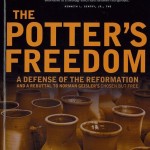 Sam Storms (“Do the Work of an Evangelist,” 39, 1, April 2014), D. A. Carson had some interesting remarks on the nature of the Christian gospel.
Sam Storms (“Do the Work of an Evangelist,” 39, 1, April 2014), D. A. Carson had some interesting remarks on the nature of the Christian gospel.
“For some Christians, ‘the gospel’ . . . is something you preach only to unconverted people. The gospel merely tips people into the kingdom; transformation and sanctification are sustained by discipleship. Once people become Christians, then the work of life transformation begins, often buttressed by various discipleship seminars: ‘Biblical Leadership,’ ‘Learning to Pray,’ ‘What to Do with Your Money,’ ‘Christian Marriage,’ and so forth—none of which falls under ‘gospel,’ but only under post-gospel discipleship. In recent years, however, many preachers and theologians have convincingly argued that ‘gospel’/’evangel’ is the larger category under which both evangelism and discipleship fall. In the NT, gospel is not everything—it is not law, for instance—but it is a very big thing, precisely because it is the unimaginably great news about what God is doing in and through King Jesus, especially in and through his cross and resurrection. A careful reading of Scripture shows how often Christian conduct is grounded in the gospel itself. For instance, the gospel is to be obeyed (e.g., 2 Thess 1:8); certain behavior conforms to the gospel, while other behavior does not (1 Tim 1:10–11). Husbands are to love their wives as Christ loved the church and gave himself up for her (Eph 5:25)—transparently, this is a gospel appeal. In short, in the NT the gospel is preached both to unbelievers and to believers. It calls unbelievers to repentance and faith; it calls believers to ongoing faith and conformity to Jesus. In other words, gospel ministry includes but is not restricted to what we commonly call evangelistic ministry (note the two words, gospel and evangelistic, making the discussion confusing). Gospel ministry is ministry that is faithful to the gospel, that announces the gospel and applies the gospel and encourages people to believe the gospel and thus live out the gospel.”
I want to draw your attention to Carson’s observation that “a careful reading of Scripture shows how often Christian conduct is grounded in the gospel itself.” Here is why.
One of the distinctive theological emphases in Acts 29 is what we call gospel centrality. In our effort to unpack what this means, we want people to understand that the gospel “is not only the means by which people are saved, but also the truth and power by which people are sanctified; it is the truth of the Gospel that enables us to genuinely and joyfully do what is pleasing to God and to grow in progressive conformity to the image of Christ.” This is, at least in part, what Carson has in mind.
To be “gospel-centered” does not mean you consistently conduct an altar call at the close of every Sunday sermon! Gospel-centrality as we understand it in Acts 29 begins with the reality that the gospel is not simply the entry point into the Christian life but also the foundation and force that shapes all we do as followers of Jesus both in our daily lives and in our experience as the corporate body of Christ. The gospel, which is the good news of what God has graciously done in the incarnation, life, death, and resurrection of Jesus Christ to satisfy his own wrath and secure the forgiveness of sins and perfect righteousness for all who trust in him by faith alone, informs, controls, and energizes all we do, whether that be the dynamics of interpersonal relationships, marriage, work, our use of money, speech, parenting, mission, and all aspects of ministry in the local church and beyond.
Consider the following small sampling of how all of life and local church ministry are influenced when the Gospel is at the Center.
Our approach to suffering, that is to say, how to suffer unjustly without growing bitter and resentful is tied directly to the way Christ suffered for us and did so without reviling those who reviled him – “when he suffered, he did not threaten, but continued entrusting himself to him who judges justly” (1 Peter 2:23; see 2:18-25; 3:17-18).
Or take humility as another example. The basis for Paul’s appeal that we “do nothing from selfish ambition or conceit but in humility count others more significant than” ourselves is the self-sacrifice of God the Son in becoming a human and submitting to death, even death on a cross (Philippians 2:1-5 in relation to 2:6-11).
All of us know that as husbands we are to love our wives “as Christ loved the church and gave himself up for her” (Ephesians 5:25-33).
Why should we be generous and sacrificial with our money? Because, says Paul, “you know the grace of our Lord Jesus Christ, that though he was rich, yet for your sake he became poor, so that you by his poverty might become rich” (2 Corinthians 8:9; 9:13).
We are to forgive one another “as God in Christ forgave” us (Ephesians 4:32; Colossians 3:13).
We are to “walk in love” toward each other, says Paul, “as Christ loved us and gave himself up for us” (Ephesians 5:1-2).
We are to serve one another in humility as Christ served his disciples by washing their feet and eventually suffering in their stead (John 13:1-20).
The freedom we have in Christ, says Paul in Romans 14, is to be controlled in its exercise by the recognition that the weaker brother who might be damaged by our behavior is one for whom Christ died (Romans 14).
Paul encourages us to pray for all based on the fact that Christ “gave himself as a ransom for all” (1 Timothy 2:1-7)
If that were not enough, there are countless instances in the NT where we are directed back to the reality of the gospel and what Christ has done for us through it as the primary way to combat those false beliefs and feelings that hinder our spiritual growth. So, for example, . . .
When you don’t feel loved by others, meditate on Rom. 5:5-11; 8:35-39.
When you don’t have a sense of any personal value, read Mt. 10:29-31; 1 John 3:1-3.
When you struggle to find meaning in life, study Eph. 1:4-14; Rom. 11:33-36.
When you don’t feel useful, consider 1 Cor. 15:58; 12:7-27.
When you feel unjustly criticized, rest in the truth of Rom. 8:33-34.
When you feel excluded by others, rejoice in Heb. 13:5-6.
When you feel you have no good works, let Eph. 2:8-10 have its effect.
When you are constantly asking the question: Who am I? take courage in 1 Peter 2:9-10.
When you live in fear that other people have the power to destroy or undermine who you are, be strengthened by Heb. 13:5-6; Rom. 8:31-34.
When you don’t feel like you belong anywhere, take comfort from Eph. 4:1-16; 1 Cor. 12:13.
When Satan accuses you of being a constant failure, remind him of 1 Cor. 1:30-31.
When Satan tells you that you are an embarrassment to the church, quote Eph. 3:10.
When you find yourself bitter towards the Church and indifferent regarding its ministries, reflect on Acts 20:28.
When you find yourself shamed into silence when confronted by non-Christians, be encouraged with 2 Tim. 1:8-12.
When you find yourself experiencing prejudice against those of another race or culture, memorize and act upon the truth of Rom. 1:16; 2 Cor. 5:14-16; Eph. 2:11ff.; Revelation 5.
When you struggle with pride and boasting in your own achievements, be humbled by Rom. 3:27-28; 1 Cor. 1:18-25, 30-31.
When you feel despair and hopelessness, let Rom. 5:1-10 restore your confidence.
When you feel defeated by sin and hopeless ever to change, delight yourself in Rom. 7:24-25.
When you feel condemned by God for your multiple, repeated failures, speak aloud the words of Rom. 8:1.
When you lack power to resist conforming to the world, consider Rom. 12:1-2; Gal. 6:14.
When you feel weak and powerless, be energized by Rom. 16:25.
When you are tempted sexually, never forget 1 Cor. 6:18-20.
And again, when you find yourself saying . . .
I’m not having any impact in life or on others, be uplifted by 2 Cor. 12:9-10.
I feel guilty and filled with shame all the time for my sins, be reminded of Eph. 1:7.
I live in constant fear, be encouraged by Luke 12:32; Rev. 2:9-11.
I struggle with anxiety and worry about everything, don’t neglect the truth of Mt. 6:25-34; Phil. 4:6-7; 1 Pt. 5:6-7.
I am defined and controlled by my past, look to 2 Cor. 5:17.
I live in fear that God will abandon me, consider his promise in Rom. 8:35-38.
I can’t break free of my sins and bad habits, linger long with Rom. 6:6,14.
I’m afraid to pray and fear that God will mock my petitions, take heart from Heb. 4:14-16.
I carry grudges against those who’ve wronged me and live in bitterness towards them, reflect and meditate on Col. 3:12-13.
I can’t find strength to serve others, fearing that I’ll be taken advantage of by them, let Phil. 2:5-11; and Mark 10:45 have their way in your life.
I’m a spiritual orphan and belong to no one, rejoice in Gal. 4:4-7.
Each of these texts refers to the gospel of what God has done for us in the life, death, and resurrection of Christ and each text applies that gospel truth to the particular problem noted. These, then, are just a handful of the ways that the gospel affects all of life, all of ministry, and everything we seek to be and do and accomplish as Christians and as local churches.




